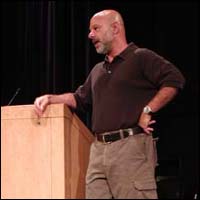It’s a good sign that the weekend will be memorable when you’re put up in a swanky hotel and invited to attend a free barbecue dinner.
That’s how the seventh annual AAN/Medill Writers Workshop began this past weekend. For two days, 78 writers and editors from alt-weeklies across the country convened in Evanston, Ill., at Northwestern University’s Medill School of Journalism to brush up on our skills, learn some new techniques, network and, of course, quaff a few drinks.
The workshop started Friday afternoon with a session on crime and justice reporting led by Chicago Reader staff writer Steve Bogira. After opening the workshop by asking us whether criminal justice was underreported or over-reported, Bogira honed in on our consensus that criminal justice is underreported because of time constraints. Many courtroom battles unfold over several months, making it difficult for weeklies with a limited staff to let reporters wander around courthouses day to day.
Bogira, whose book, “Courtroom 302,” depicts a year in a county courtroom, recommended focusing on everyday trials that demonstrate how the courts really work and how people of various walks of life intersect.
Forget about the Michael Jackson trial or the Martha Stewart case. “Take the usual and find the unusual in it,” Bogira said.
After Bogira, we listened to Mike Sager, a writer-at-large for Esquire and author of “Scary Monsters and Super Freaks,” who offered tips on how to make our stories sing. Sager told us that the inclusion of interesting details is one of the keys to crafting a compelling story. He suggested putting everything you learn from interviews into a “bowl of details” — every quote, observation and description. As you write, arrange the details selectively to pull the reader in, create a scene and make nuances pop out.
He also stressed the importance of what’s not written. “Omission is key,” Sager said. “Sometimes less is more.”
He encouraged us to start our stories with the second most interesting tidbit. Don’t reveal everything at once, he told us, to maintain the “holy shit!” factor until the end.
If Sager ever tires of writing, here’s his next gig: being a spokesman for Olympus products. He recommended we all buy the $199 PC Transcription Kit that includes a foot pedal to help transcribe extensive interviews or the $17 Noise Cancellation Microphone to better record soft-voiced sources.
That evening we noshed on ribs, chicken, pork chops, cornbread, potato salad and Texas toast at Merle’s, a wood-paneled barbecue joint in Evanston. A cash bar helped loosen the tongues of editors and writers who mingled at six tables. We drank together, talked shit together and debated over Dubya’s latest poppycock decision.
After dinner most of us moseyed over to Tommy Nevin’s Pub, where Guinness and Irish car bombs flowed. I called it a night after that, but a couple editors stayed out until the wee hours of the morning frolicking on the beach of Lake Michigan. We heard them complaining the following day about sand in their beds.
Saturday started with an interactive discussion with Westword editor Patty Calhoun and former Westword writer Julie Jargon. Calhoun and Jargon explained how they unraveled the Air Force Academy rape scandal that started with an email tip and soon became a national story. Jargon, who now works at Crain’s Chicago Business, and Calhoun, the founder of Westword, answered questions from attendees and described how they fended off journalistic competition and tracked down Air Force officials to comment on the egregious behavior of the cadets.
Next, we heard from Bogira on the art of interviewing. Among other tips, he told writers to be patient and pay close attention to the tone of a source’s voice as well as his or her body language. Many people are inarticulate or shy, Bogira explained, and you’ll miss half the story if you only listen to their words.
After a buffet lunch of sandwiches, salad and cookies, we broke up into groups of three to five writers for personal critiques. I was in a group with Gambit Weekly editor Michael Tisserand and The Reader (Omaha) editor John Heaston. Michael and John critiqued two writers and myself for about 20 minutes each on articles we had submitted prior to the workshop.
It was extremely helpful to hear from editors who had never read our writings and weren’t familiar with our styles. During the session, John suggested calling someone for help when you’re bogged down with a story. Try to explain the issue to a friend or relative to help you wade through the minutia and find the “smoking gun” of a story. Michael warned us away from writing hybrid stories that mix profiles with policy issues, which ultimately will confuse readers, urging us instead to use a person to illustrate a trend or issue.
The kicker of the conference was listening to Dan Savage, editor of The Stranger and author of the syndicated sex column Savage Love. His topic: On Not Sucking. Laughter filled the room from the get-go when Savage told us his success came from having a “skanky paper.” He mentioned anallingus at least 20 times (referring to actions of daily journalists and conservatives) and criticized “clenched-butt weirdoes” (Republicans, of course) through a handful of sentiments.
Ultimately, Savage left us with suggestions on how to save alt-weeklies. He told us to embrace our passionate, edgy voices and be “cheerfully elitist.” We should rally around cities, which are diverse, he said, and “fuck the farm.” (He added that he didn’t mean that literally.) Savage left us with an optimistic prophecy: Dailies are going to die if they don’t become “alt-weekly like us.”
Alyssa Abkowitz is a staff writer for Creative Loafing (Atlanta).

